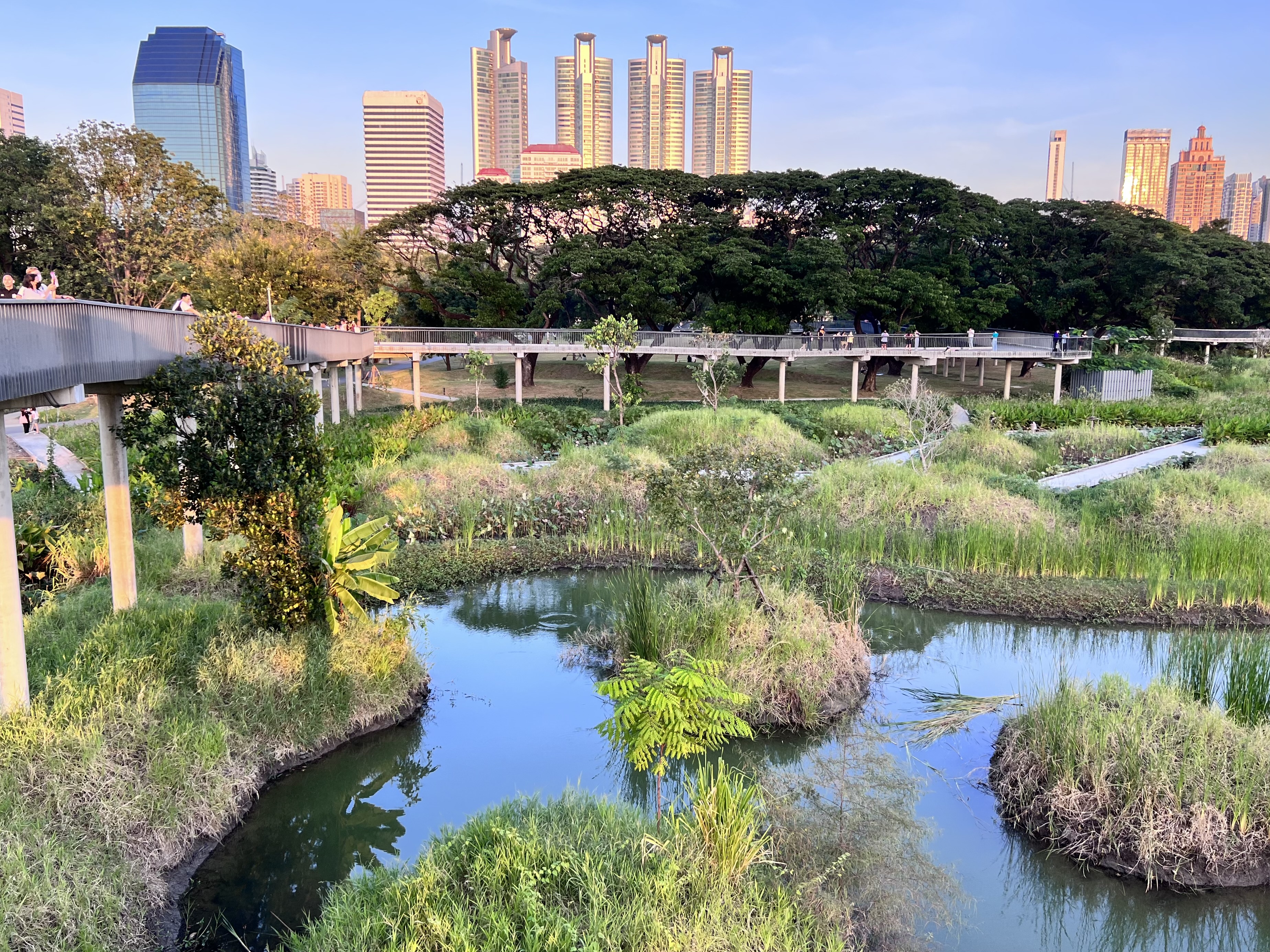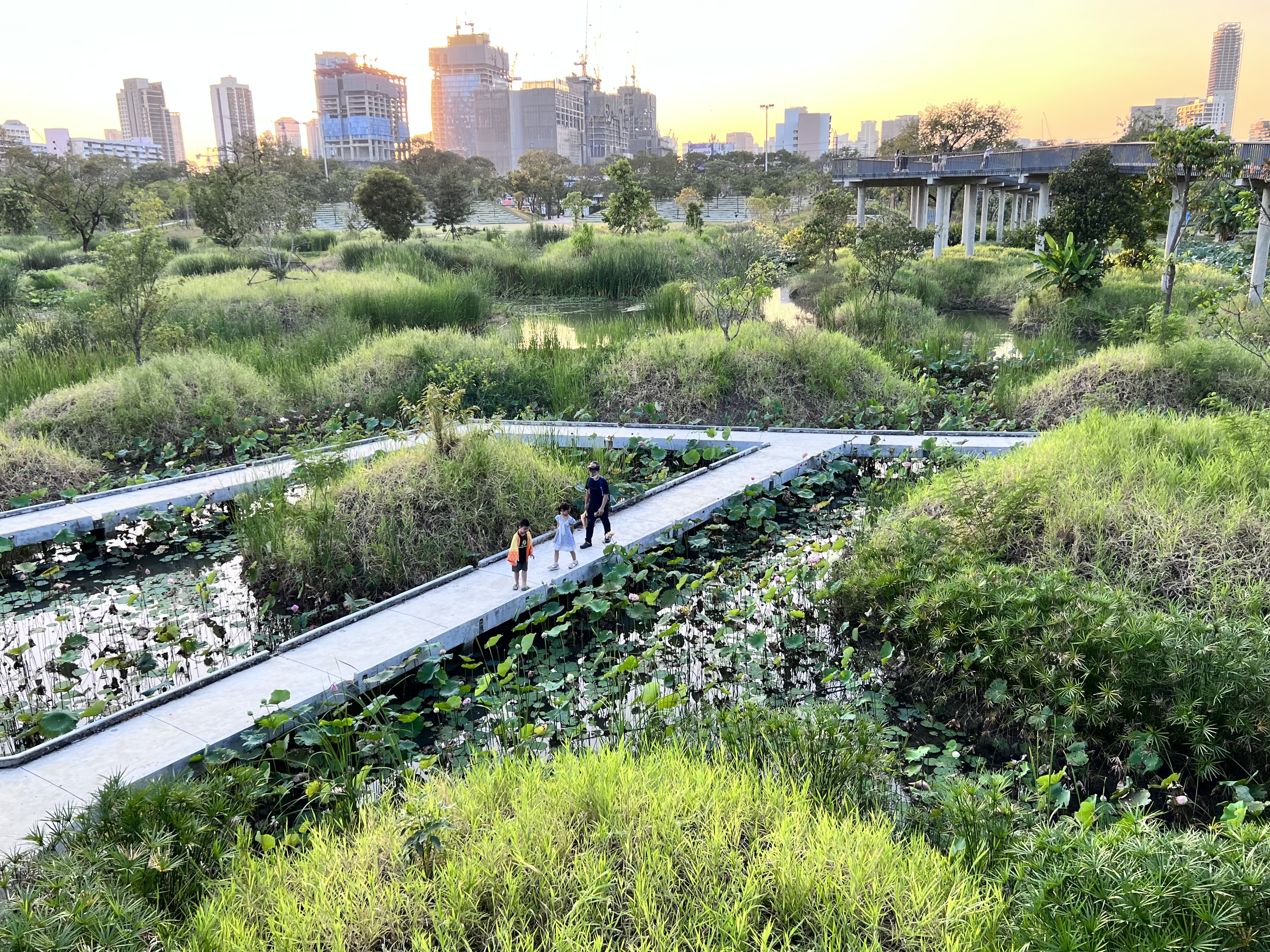Blog by Sean Lees, Business and Human Rights Specialist, UNDP Asia Pacific
COP27 and the Business and Human Rights Agenda
November 3, 2022

Bangkok’s new Benjikiti Forest Park enhances biodiversity, addresses water pollution and combats climate change impacts.
I am walking above lotus ponds and small Bodhi trees across a skywalk in Bangkok’s newly opened, Benjikiti Forest Park. Thais and foreigners alike are smiling widely on the elevated walkway, posing for selfies in the yellow and orange hues of sunset. Bangkok’s Forest Park might be more aptly named, “sponge park,” designed as it was to soak up the heavy tropical downpours of the rainy season. The watery gardens and native trees cover over 40 hectares (approx. 100 acres) in the heart of the city, and cleanse the city’s water runoff before being released to the nearby Chao Phraya River. It is a project that addresses both environmental challenges in a time of climate change, and the mental health needs of a city bulging with 10 million people.
News of the project’s success is welcome, and especially of its potential to enhance biodiversity, address water pollution and combat climate change impacts. Elsewhere, grim reports are being filed in the lead up to COP27 where governments will meet to discuss progress under the principles of the UN Framework Convention on Climate Change. The data shows that we are not on track to meet the goals agreed in Paris seven years ago during COP21.
Carbon emissions and temperatures continue to rise, with catastrophic results in recent years including in Pakistan and the Philippines. Climate finance, technology transfer and capacity building commitments are largely not being met, and only 23 of 193 countries have filed updated national climate plans containing more ambitious greenhouse gas reduction targets.
While COP27 will address these shortcomings, it will also promote solutions including a global carbon credit market, and loss and damage financing. Loss and damage financing is considered the most controversial segment of the upcoming climate conference. Under this scheme, developed countries would provide compensation for adverse climate change impacts in undeveloped countries, countries that have contributed the least to climate change.
Of course, Asia-Pacific countries must and will play a critical role at COP27, hosted this year by the government of Egypt. Asia-Pacific is considered the region most vulnerable to climate change with its large and densely populated mega-cities, lengthy low-lying coastlines, and its frequent exposure to severe weather events, including drought and flooding. As such, billions of people find at risk their right to food, livelihoods, land tenure and access to clean water and clean air. Climate change is also exacerbating preexisting inequalities suffered by Asia’s Indigenous Peoples, women, and the poor. Still, Asia is also the region that contributes the world’s greatest amount of greenhouse gases, approximately 52%. As such, some observers are suggesting that Asia should be at the center of the global climate change dialogue. Action in Asia may be among the most critical factors in reducing emissions and reducing threats from climate-related disasters.

Benjikiti covers over 40 hectares (approx. 100 acres) in the heart of the city.
Benjikiti Forest Park is a dramatic and tangible example of governments responding to environmental challenges, but it is still a small gesture in relative terms. Governments in the region will also need to enforce laws already on the books to address widespread burning and clearing of forests and agricultural lands. Powerful oil and gas producers, some of them state-owned, must also be taken to task for failing to control methane gas release. A wide range of factories must be more closely monitored for their PM 2.5 and carbon reduction efforts. Securities regulators must bring more exacting language to ESG (Environmental, Social and Governance) investing criteria. And all businesses must take up environmental and human rights due diligence processes to identify, respond and prevent adverse impacts of emissions on people, particularly the most vulnerable.
To ensure consolidated responses from business, the UN Guiding Principles on Business and Human Rights (UNGPs) may provide a helpful framework. Unanimously adopted by the Human Rights Council in 2011, the UNGPs are widely considered the world’s most authoritative, normative framework guiding responsible business conduct today. The uptake of the UNGPs in Asia has been gaining momentum over the last 5 years, but only recently have policymakers been exploring the nexus between this instrument and the environment.
Importantly, accountability is both a central feature of the UNGPs and a strong theme at COP27 under the loss and damage heading. But a focus on accountability raises a host of other questions about proposed climate change solutions.
For example, should loss and damage compensation go to countries that are not doing enough to arrest deforestation or other factors contributing to climate change? What about developing countries that are making investments in new coal-burning power plants or mining operations? Should climate financing or remedies be provided to countries that score low on anti-corruption benchmarks?
Looking at the Global North, I wonder how many banks and energy industry leads in Asia’s advanced economies are showing up in Egypt compared to Glasgow? And more importantly, what progress is being made in holding these corporates accountable for their net-zero pledges made at COP 25 or 26? Carbon credit markets sound familiar. How will we ensure they are not used to confuse the public or dissipate attention on the operational profiles of carbon-heavy polluters? Will they distract from efforts to hold bad-actors accountable?
I will not be going to Egypt for COP27, instead, staying near enough to the Benjikiti Forest Park for an occasional sunset walk. But despite my distance from the COP27, I cannot help but feel we are all implicated in events and decisions that will unfold there. We need to watch closely, ensure commitments lead to action, and be ready to ask difficult questions.

 Locations
Locations